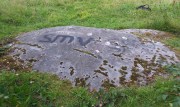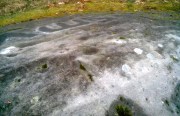Cup-Marked Stone: OS Grid Reference – NS 50301 73655
Also Known as:
- Auchnacraig
- Canmore ID 44536
Along the A810 Bearsden to Dunochter road, 100 yards past the Faifley roundabout, turn right up Cochno Road. Go up for literally 1 mile and hit the car-park. Go back onto the road and walk uphill. Barely 50 yards up, turn right and walk down the track. About 350 yards along its bendy route, some grasslands appear on your right and there, about 40 yards away, is the large Cochno-5 carving.
Archaeology & History
First described by James Harvey (1889) in association with adjacent carvings, he told that “there are eight isolated cups, two of which have a diameter of 2½ inches” on this stone. Harvey was one of those who loved the idea that our ancestors were etching cup-marks as receptacles for collecting blood and similar christian fantasies. It was a bittova fad at the time.
As we can see, the kids have sprayed their own ID onto the stone. It’s highly unlikely that they were even aware of this being a prehistoric site as there’s nothing to indicate it as such, and I know of archaeologists who wouldn’t have even seen the cup-marks on the stone, so we can’t really apportion blame. (We must recall that businessman Tom Lonsdale and Ilkley Council branded such things as “twenty-first century informal unauthorised carvings” when they sought and succeeded to get large amounts of cash to justify their own ‘brand’ of vandalism and called it ‘art’. Very common amongst those social types.)
References:
- Harvey, James, “Notes on Some Undescribed Cup-Marked Rocks at Duntocher, Dumbartonshire”, in Proceedings Society Antiquaries, Scotland, volume 23, 1889.
Acknowledgements: Huge thanks to the awesome Aisha Domleo and her little dynamic duo for helping us get to this site.
© Paul Bennett, The Northern Antiquarian
The map could not be loaded. Please contact the site owner.


